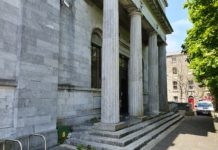A man who came to Galway in 2017 to help with the survivors of the Tuam Mother and Baby Home said that he ended up letting the house he was renting in Ahascragh be used as a grow house after borrowing money.
Anthony Fennell (52), from Kildonnan Road in Finglas, appeared before Galway Circuit Court for sentencing after previously pleading guilty to cultivating cannabis.
During the sentencing hearing, counsel for Mr Fennell said that his life had felt a “calling” to help the elderly survivors of the Tuam Home due to his own childhood in an industrial school and care home.
Mr Peter Mulryan, co-founder of the Tuam Home Survivors Network, also gave evidence to the court as a character witness for Fennell.
Judge Rory McCabe said that he sympathised with what Fennell suffered in his childhood, but that he could not ignore the seriousness of the offence.
“He made a bad decision and, like all of us who make a bad decision, he’s going to have to face the consequences.”
Grow House
Garda Owen Fox gave evidence that on September 10 of 2019, he searched a house near Killure Castle, Ahascragh, Ballinasloe under warrant.
Fennell had been renting the property for two years since he came to the area to help with the inquiry into the Tuam Mother and Baby Home, and the survivors’ search for answers.
In the house Garda Fox said that a “sophisticated cannabis grow house” was found on the upper floor of the building, with a hydration system, air filters and multiple feed systems to aid plant growth.
A makeshift door with plastic sheeting had been constructed at the top of the stairs, and multiple walls had been knocked through in order to create a larger space.
There were 49 cannabis plants in the mid to mature stage of their growth found in the grow house, with a potential street value of €39,200 when the drugs were harvested.
When he was interviewed by Gardaí, Fennell, who had been a very successful plasterer, said that he had burned through all his savings since coming to Galway and devoting his time to the Tuam home inquiry.
After this, he told Gardaí, he borrowed money from people who decided that the property would be used as a grow house. He told Garda Fox “I’m not in control of this situation any more”.
The state accepted his plea to the charge of cultivation alone, not prosecuting the other charges of possession of drugs, and possession with the intent to sell or supply.
The Circuit Court heard evidence of Mr Fennell’s extremely difficult upbringing, which is what had drawn him to the survivors of the Tuam Home.
He was born in the Summerhill tenements in Dublin, and spent years of his childhood at St. Anne’s industrial school after being abandoned by his mother.
At 12 his mother came at took him to Wales, where he went on to suffer worse conditions at a care home after she was unable to keep him, Fennell’s counsel said.
Despite this, as an adult he became a master plasterer and worked on projects including Disneyland in France, and Ramstein Air Force Base in Germany, and also refurbished pubs.
Mr Fennell’s counsel said that he understands that he made a bad decision, but felt at the time that he had a calling to help in Tuam.
Judge McCabe asked if Fennell’s rationale was that “his ends justify his means?”, and said that there was an “internal contradiction” in his actions, that he came to Galway to help survivors of childhood trauma, but contributed to the drug trade in the community.
Peter Mulryan told the court that Fennell is a “marvellous person” who “put his heart and soul” into helping older people connected to the Tuam Mother and Baby Home, with transport, online forms, and home refurbishments, because he had been through much the same himself.
Judge McCabe said that he sympathised with what Fennell suffered. But the character reference didn’t mitigate the offence “to any significant degree”.









